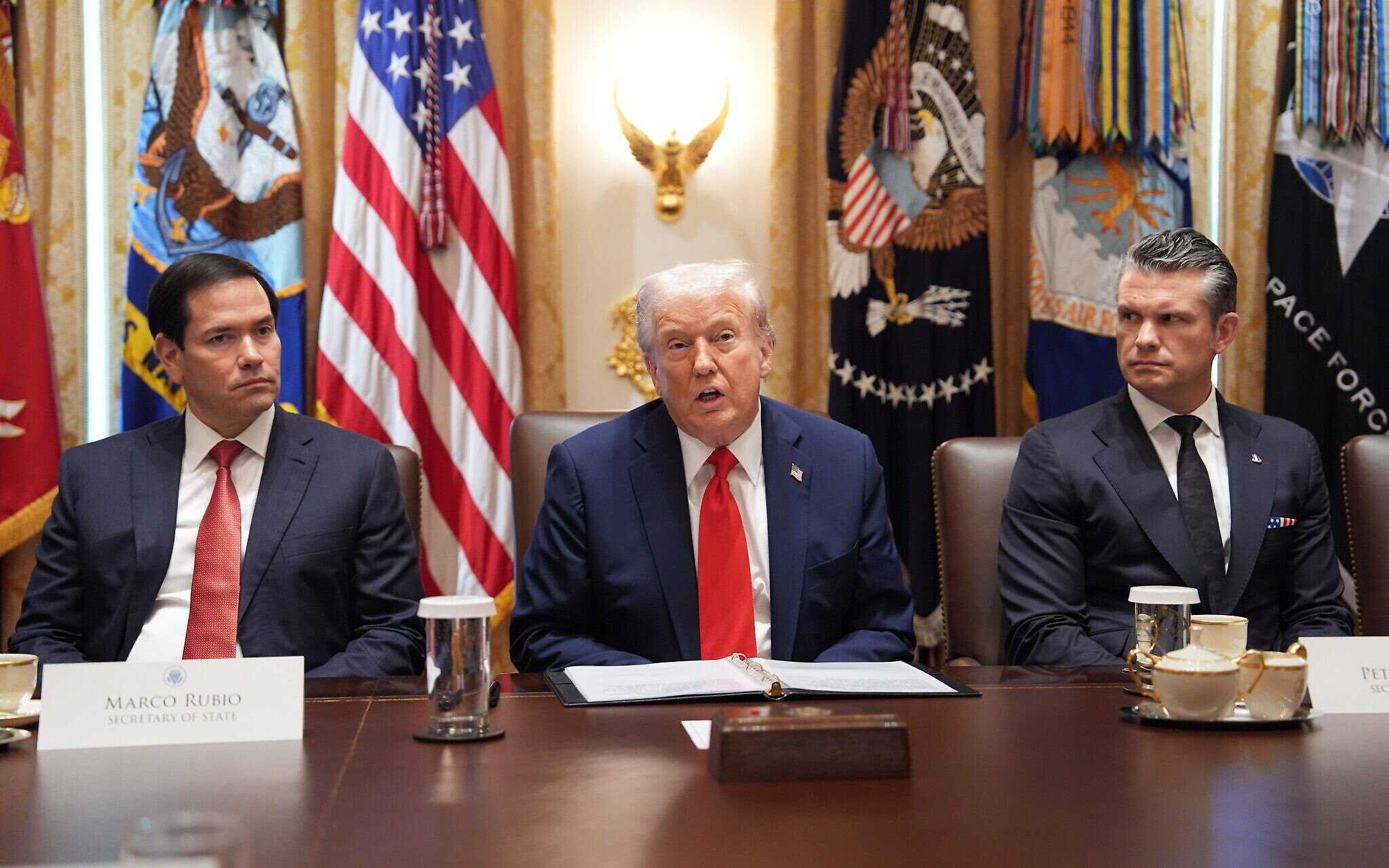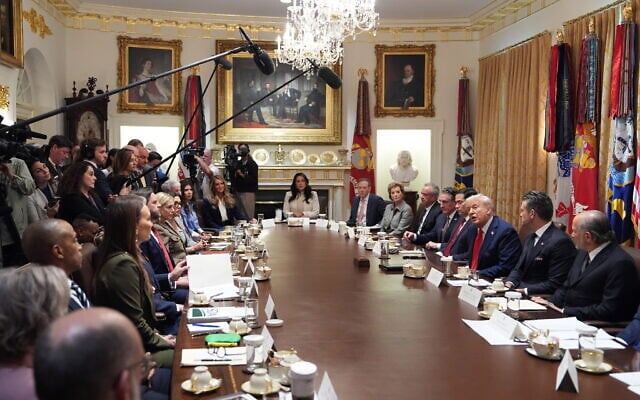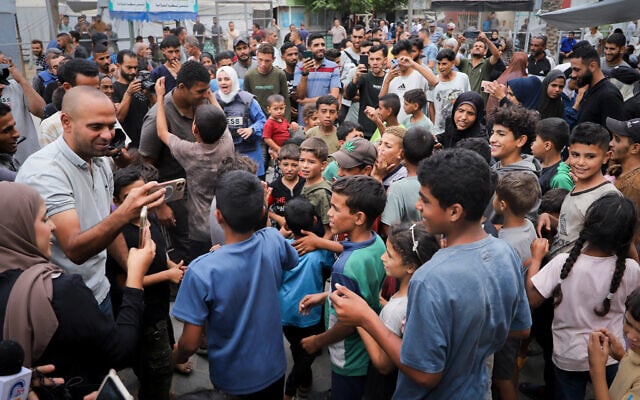


US President Donald Trump declared Thursday that he had succeeded in ending the war in Gaza, while indicating that issues pertaining to the post-war management of the territory still need to be finalized.
“Last night, we reached a momentous breakthrough in the Middle East,” Trump said at the beginning of a cabinet meeting in the White House. “We ended the war in Gaza, and on a much bigger basis, created peace… hopefully an everlasting peace in the Middle East.”
That framing is not shared by Prime Minister Benjamin Netanyahu, who has insisted that an end to the war can only be declared once Hamas disarms and Gaza has been demilitarized.
But the mediators have sold a different version in order to convince Hamas to agree to release all 48 remaining hostages up front, assuring the terror group that Israel won’t be allowed to resume the war after the captives have been returned.
Trump’s 20-point plan does envision the disarmament of Hamas, but the agreement inked earlier Thursday in Egypt was only on what the parties are describing as the “first phase,” pertaining largely to the hostage-prisoner swap and Israel’s initial, limited withdrawal from Gaza.
Asked what guarantees the US provided in negotiations to ensure that Hamas disarms and that Israel doesn’t resume the war, Trump told reporters that the first priority was securing the release of the hostages.
“That’s what people wanted more than anything else… After that, we’ll see,” Trump said, indicating that a lot remains left to be negotiated. “But [Hamas has] agreed to things, and I think it’s going to move along pretty well.”
Asked later Thursday for more details on the International Stabilization Force that subsequent, yet-to-be-approved phases of the deal envisions, Trump said it still needs “to be determined.”
“There are going to be a large group of people determining what it will be,” he said, adding that “wealthy countries” will fund the force.
He said at the cabinet meeting that Hamas has lost “70,000 people” since the terror group’s October 7, 2023, attack, apparently rounding up the Hamas-run Gaza health ministry’s death toll, which doesn’t differentiate between civilians and combatants.
“From the Hamas standpoint, they probably lost 70,000 people. That’s big retribution,” Trump said.
Israel says it had killed some 22,000 combatants in the war as of August.
“But at some point that whole thing had to stop, and we’re going to see to it,” Trump said.
The president declined to get into specifics regarding the second phase of the agreement, but insisted that Hamas will disarm and that the IDF will pull back its troops. He highlighted the “22 different things that will take place,” apparently referring to his 20-point plan for ending the war.
“I think it will take place, and I think you can end up with peace in the Middle East,” Trump said.
Pressed on his view regarding a two-state solution, he responded, “I don’t have a view. I’m going to go with what they agree to.”
The 20-point plan for ending the Gaza war that he presented last week creates a pathway for the potential creation of a Palestinian state.
Asked whether Palestinians will be allowed to remain in Gaza — which his plan explicitly encourages — Trump said the US will work to make the Strip more livable with the help of wealthy Arab and Muslim states.
After telling hostage families hours earlier that all of the captives will be released on Monday, Trump said during the cabinet meeting that it may not happen until Tuesday.
“Getting them is a complicated process. I’d rather not tell you what they have to do to get them,” Trump said.
He acknowledged that the roughly 28 bodies of dead hostages held in Gaza will be “a little bit hard to find.”
“But we have the hostages for the most part, and I don’t think it’s going to be an overly big situation with the bodies… We’re going to do the best we can,” Trump said.
The president reiterated that he plans to travel to the Middle East in the coming days, though the trip has not been finalized.
He did say he plans to go to Egypt to participate in a signing ceremony but didn’t initially mention a stop in Israel, even though Israeli officials have said they’re planning for such a visit on Sunday.
Later Thursday, Trump told reporters in the Oval Office that he plans to leave for the Middle East on Sunday and hopes to be in Israel when the hostages are released on Monday or Tuesday.
When asked about a potential speech before the Knesset, Trump reiterated that he’s open to doing so after being invited by Netanyahu.
He quipped that while the prime minister may have been unpopular in Israel before this Gaza deal was reached, that is no longer the case.
Trump has made no secret of his desire to win the Nobel Peace Prize, whose laureate will be announced Friday. At the previous US cabinet meeting, special envoy Steve Witkoff said he wished the “Noble” Committee would “get its act together” and award Trump the prize, garnering applause from the other cabinet members in the room.
On social media, Netanyahu shared an AI-generated photo of Trump with a Nobel Prize medal around his neck.
“Give Donald Trump the Nobel Peace Prize – he deserves it!” tweeted Netanyahu, who nominated the president for the prize earlier this year.
But the deadline for submissions for the 2025 prize was in December, several months before Netanyahu presented Trump with the letter of recommendation that the premier made to the Nobel committee.
While others submitted nominations for Trump before the deadline, a decision on the winner was already made last week, before the Gaza ceasefire and hostage release deal was inked, in what is likely to further limit Trump’s chances to win the prize this year.
Asked later Thursday about his chances for winning a Nobel Peace Prize the next day, Trump touted the eight agreements that he brokered to solve conflicts across the globe since returning to office, with yesterday’s Gaza deal being the “biggest.”



